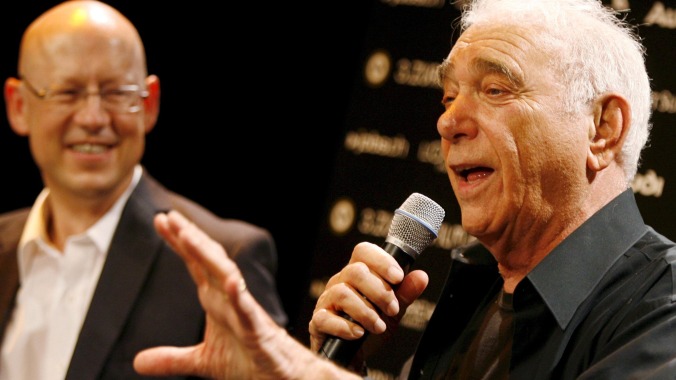R.I.P. Al Ruddy, Oscar-winning producer of The Godfather and Million Dollar Baby
The co-creator of Hogan's Heroes, Albert S. Ruddy, was 94
Aux Features Million Dollar Baby
Photo: Steffen Schmidt (EPA/Shutterstock)
Albert S. Ruddy, the two-time Best Picture-winning producer of The Godfather and Million Dollar Baby, has died. As confirmed to Deadline by a family spokesperson, Ruddy died at UCLA Ronald Reagan Medical Center following a brief illness on May 25. He was 94.
“Among the last words of Albert S. Ruddy: ‘The game is over, but we won the game!’ Ruddy’s wife, Wanda McDaniel, wrote on Instagram. “You slayed the game of life, my darling. The void you leave behind is as immense as our love. You were human effervescence, the bubbles in the tonic. As Emily Dickenson [sic] said: ‘Unable are the loved to die, for love is immortality.’ You were adored by so many, a Hollywood legend and sweetheart. Rest in peace, my unique, urbane, brilliant husband. You are now my heart — always my forever love and my man in the arena.”
Like many of his collaborators, Ruddy’s career began with Roger Corman. Stumbling into the role of art director on Corman’s The Beast With A Million Eyes, Ruddy was paid $50 in 1955 to design the monster—albeit with considerably fewer eyes. Seeing himself as a master deal maker, Ruddy, while working at a construction firm, met Warner Bros. President Jack Warner at a party and left with a job in show business. Ruddy started as a TV writer, earning a credit on The Lloyd Bridges Show before going to produce the teen runaway drama The Wild Seed.
He didn’t have to wait long for a breakthrough. After The Wild Seed, Ruddy co-created Hogan’s Heroes with Sergeant Bilko actor Bernard Fein. Set in a Nazi prisoner-of-war camp during World War II, the series ran for six seasons and more than 150 episodes. The show was a critical and commercial hit, earning two Emmys—both of which went to Colonel Wilhelm Klink himself, Werner Klemperer. But the series was a notable evolution from the other war-based sitcoms, like McHale’s Navy and Bilko, marrying silly sitcom antics with the grim realities of war. Of course, the show was also criticized for the same reasons, with some believing that light-hearted versions of Nazis weren’t fodder for hijinks.
As Hogan’s Heroes wound down, Ruddy began producing movies again, releasing the Robert Redford dirt bike film Little Fauss And Big Halsey and Making It. Neither likely prepared him for his next project, The Godfather. Ruddy’s towering frame and gravelly voice kept the picture on track as he met with actual crime families and 1,500 delegates of the Italian-America Civil Rights Leagues to keep the film from falling into gangster film cliche—as well as keeping them appeased with a film many would say wasn’t the most positive representation of Italian Americans. The film’s production was adapted into a miniseries, The Offer, which featured Miles Teller as Ruddy.
Considered by some to be the greatest movie of all time, The Godfather was also an enormous hit, winning three Oscars, including Best Picture. As the only credited producer on the film, Ruddy accepted the statue from Clint Eastwood, the star and director of Ruddy’s next Best Picture winner, Million Dollar Baby.
Godfather made Ruddy one of Hollywood’s most successful and provocative producers. Two years after The Godfather, he released two very different comedies: the prison-based football comedy, The Longest Yard, and a satirical cartoon for adults from Ralph Bakshi called Coonskin. While the former began a successful relationship with Burt Reynolds that continued into the Cannonball Run movies in the ’80s and ended with 2006’s Cloud 9, the latter was a fiasco. Accused of racism over its use of stereotypes and caricatures, Coonskin barely received a release from Paramount Pictures. Today, cinephiles have come to recognize its anti-racist worldview, with others considering it Bakshi’s masterpiece. Regardless, it showed Ruddy wasn’t satisfied making one type of picture and longed to push boundaries—though he’d never make quite a splash like that again.
Ruddy continued to produce comedies and action movies throughout the 1980s, working with his Cannonball Run partners, Golden Harvest, a Hong Kong studio and distributor. With Golden Harvest, he produced Death Hunt, a western starring Charles Bronson, Lee Marvin, Angie Dickinson, and Carl Weathers; the Barry Bostwick vehicle Megaforce; and Cannonball Run II.
In the 1990s, between producing sports comedies Ladybugs and The Scout, Ruddy returned to TV, co-creating Walker, Texas Ranger with Leslie Grief and Paull Haggis. The show was a massive success, running over 200 episodes across eight seasons. In 2005, Ruddy won his second Oscar for Best Picture for Clint Eastwood’s Million Dollar Baby. Ruddy’s career had begun to slow down at that point, but Eastwood and Ruddy would reunite in 2021 for Cry Macho.
Born in Montreal, Quebec, on March 28, 1930, Ruddy was raised in New York City by his mother Ruth, a fur magnate. After a stint studying chemical engineering at City College of New York, Ruddy graduated with a degree in architectural design from the University of Southern California.
Ruddy is survived by his wife, Wanda McDaniel, and two children, John and Alexandria, who worked with him at Albert S. Ruddy Productions.